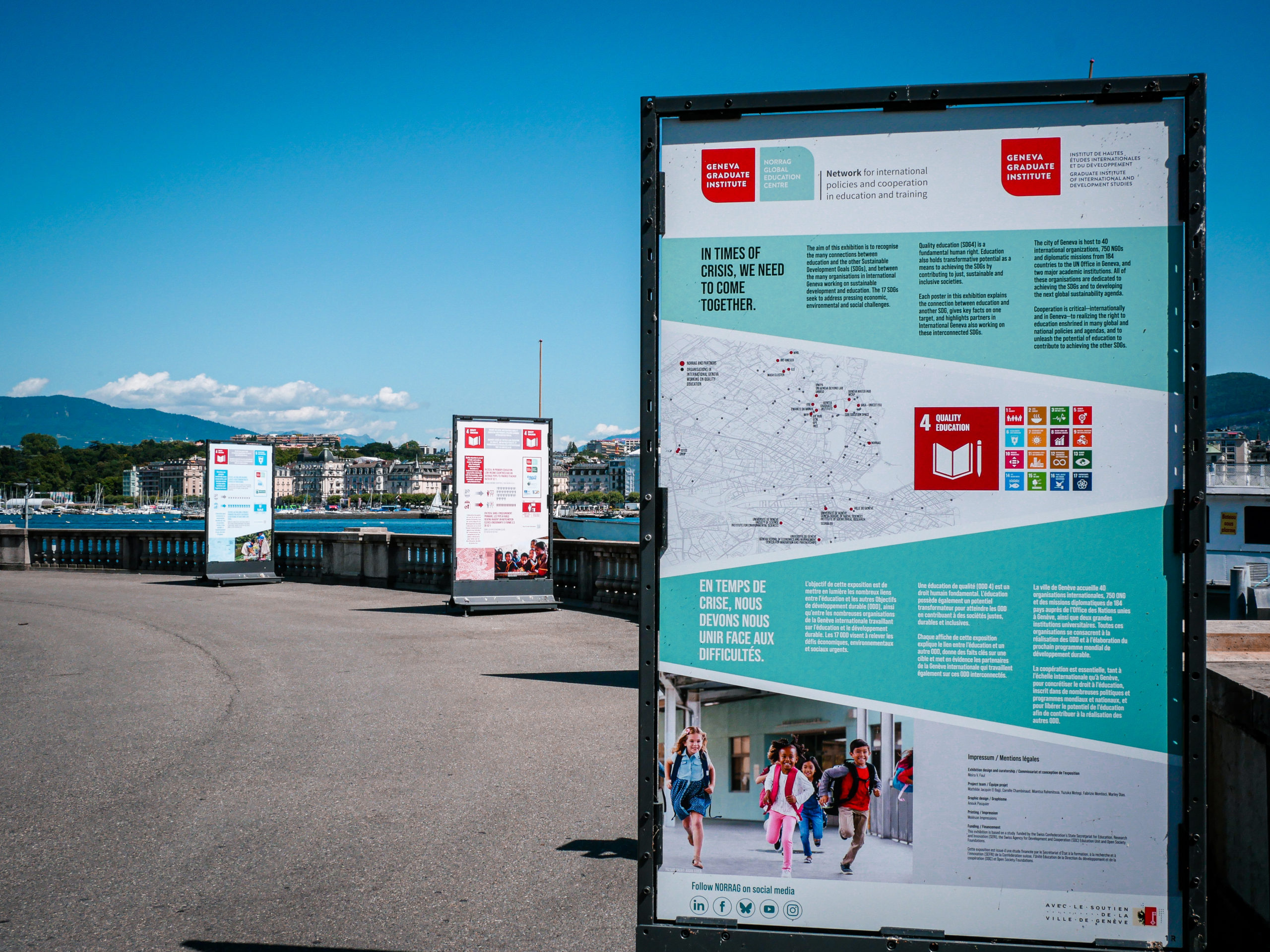Exhibition on International Cooperation in Education in Geneva
CONFIRMED WORLD TOUR DATES:
- 01-31/07/2025 – Geneva, Switzerland – Rotonde du Mont Blanc
- 16/09/2025 – Oxford, UK – UKFIET
- 22/09/2025 – New York City, US – Education for Peace & Planet, a side event to the 80th session of the UN General Assembly, Interchurch Center
- 23/09/2025 – New York City, US – Education House in parallel to the 80th session of the UN General Assembly
- 06-31/10/2025 – Geneva, Switzerland – The Fab, Maison de la Paix
- 07/10/2025 – Geneva, Switzerland – Maison des Fondations
- 30-31/10/2025 – Geneva, Switzerland – Human Rights Council World Social Forum
- 31/10-02/11/2025 – Salzburg, Austria – Salzburg Global
- 17-21/11/2025 – Geneva, Switzerland – Palais des Nations, in the side lines of the Young Activist Summit
NORRAG Launches Public Exhibition on the Role of Education in Achieving the SDGs
On July 9th, 2025, NORRAG, the Global Education Centre of the Geneva Graduate Institute, opened a public exhibition on the role of education in achieving the SDGs at the Rotonde du Mont-Blanc. The vernissage gathered a diverse audience of partners, representing International Organisations, diplomatic delegations to the UN, NGOs, and research institutions, to explore how education amplifies progress across the Sustainable Development Goals (SDGs)
H.E. M. João António Mira Gomes, Ambassador and Permanent Representative of Portugal to the United Nations Office and other international organisations in Geneva, enthusiastically welcomed the visitors to the exhibition. He acknowledged the vital contribution of education to sustainable development, noting the challenged access some face to receiving safe and quality education.
Marie-Laure Salles, Director of the Geneva Graduate Institute, observed in her remarks the relevance of education in the exhibition’s location: the heart of Geneva. The city of peace and multilateralism was depicted as a fertile ground for international collaboration and dialogue in many issues, including education.
Then, Carolina Earle, Switzerland’s Youth Representative to the Global Partnership for Education (GPE), brought the audience’s attention to the role of youth: theyare at the heart of achieving the SDGs and their diverse voices need to be central in shaping a more equitable future. According to Ms. Earle, NORRAG’s exhibition highlights how education drives transformative change across sectors, while showcasing youth demands and partnerships that demonstrate the power of cooperation for global progress.
Finally, Moira V. Faul, Executive Director of NORRAG, thanked all partners and contributors for all the work they put in to have this exhibition come to life. She recalled the challenges currently faced by the international education and development community, and pointed at the exhibition as the illustration of a community of actors coming together and showing the power of cooperation.
So here’s to international cooperation
That is locally led
And sustainably financed;
Because that is the source of our collective strength
The exhibition features a series of visually striking panels linking quality education (SDG 4) with other global priorities—climate action, gender equality, poverty reduction, and peacebuilding. It highlights the vital role of Geneva-based actors in turning academic research into policy-relevant, public-facing tools.
NORRAG’s initiative underscores the importance of accessible, multilingual storytelling in shaping public awareness and driving collaboration between research institutions and multilateral partners. The exhibition emphasizes how such partnerships—spanning UN agencies, NGOs, academic institutions, and local organizations—can transform educational research into transformative, globally resonant narratives.
NORRAG also announced that in addition to the exhibition on display in Geneva throughout July 2025, a dedicated website will extend its reach globally and remain accessible through 2030.

